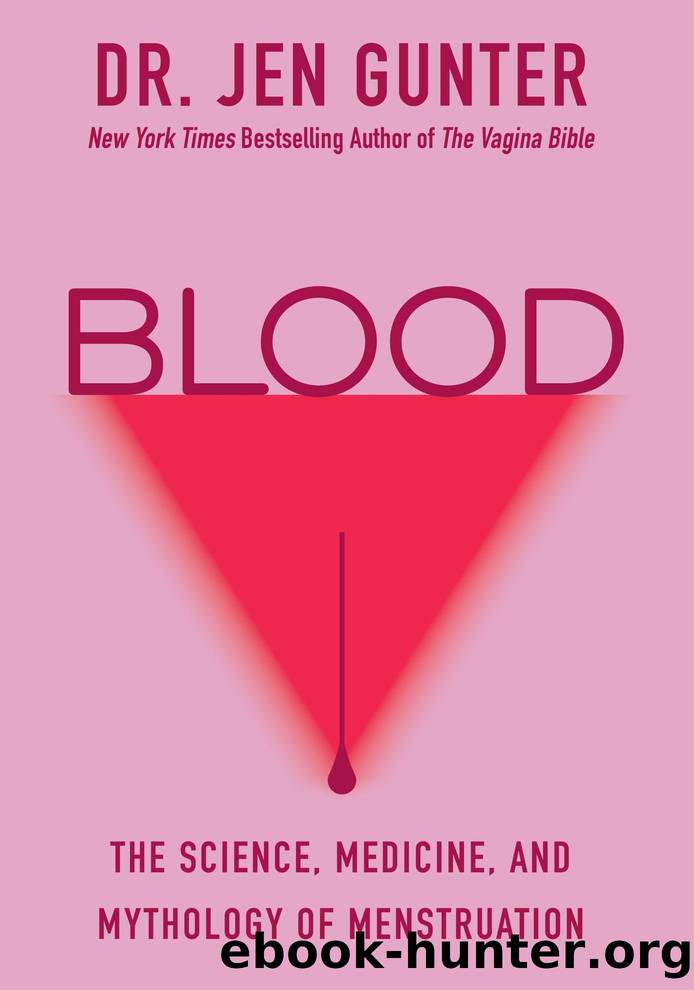Blood by Dr. Jen Gunter

Author:Dr. Jen Gunter [Gunter, Dr. Jen]
Language: eng
Format: epub
Publisher: Citadel Press
Published: 2023-11-07T00:00:00+00:00
Primary Ovarian Insufficiency
Primary ovarian insufficiency (POI) is a condition where ovulation, and hence menstruation, stops before the age of forty. It affects 1 percent of women. When I was in medical school, this condition was called premature ovarian failure or premature menopause, both of which are unacceptable terms. First, the word failure is awful here. It implies judgment, and women are judged enough already, thank you very much. Also, itâs not as if the ovaries took a test and failed, you know? Finally, POI is not the same as menopauseâfor example, menopause is permanent, but up to 50 percent of people with POI will ovulate sporadically.
Diagnosing POI is important for several reasons. First, there are health concerns. The early drop in estrogen increases the risk of cardiovascular disease (heart attack and stroke), dementia, and osteoporosis. There is also a greater risk of anxiety and depression, as well as bothersome symptoms such as hot flashes, night sweats, insomnia, and vaginal dryness. Finally, POI can cause infertility.
For most people, the cause of POI is unknown and is probably related to many factors, but causes can include:
⢠Genetic reasons, which may have other health implications, so itâs important to speak with a genetic counselor if you are diagnosed with POI.
⢠Autoimmune conditions, such as type 1 diabetes, lupus, and rheumatoid arthritis. POI can be an early sign of a rare and serious autoimmune disorder of the adrenal gland called autoimmune adrenal insufficiency. If the diagnosis of POI is confirmed, testing for autoimmune adrenal insufficiency is essential.
⢠Some forms of chemotherapy and radiation to the pelvis, as they can damage the primordial follicles in the ovary.
⢠Infections such as HIV, mumps, and tuberculosis.
⢠Smoking, because various toxins in cigarette smoke seem to damage the follicles. Some of these toxins can even be identified in the follicles.
⢠A hysterectomy, even though the ovaries are not removed, because of the postsurgical inflammation and changes to blood flow. Some surgeries on the ovary can also damage follicles.
Download
This site does not store any files on its server. We only index and link to content provided by other sites. Please contact the content providers to delete copyright contents if any and email us, we'll remove relevant links or contents immediately.
| Breast Cancer | Candida |
| Chronic Fatigue Syndrome & Fibromyalgia | Endometriosis |
| General | Lupus |
| Menopause | Menstruation |
| Postpartum Depression | Pregnancy & Childbirth |
| Sexual Health |
Name Book, The: Over 10,000 Names--Their Meanings, Origins, and Spiritual Significance by Astoria Dorothy(2966)
Tone Your Tummy Type by Denise Austin(2825)
The Ultimate Guide to Anal Sex for Women by Tristan Taormino(2284)
The Expectant Father by Armin A. Brott & Jennifer Ash(2259)
The Coregasm Workout by Debby Herbenick(2256)
The Women's Health Fitness Fix by Jen Ator(2227)
Expecting Better by Emily Oster(2203)
She-ology by Sherry A. Ross MD(2153)
The Hite Report on Shere Hite by Shere Hite(2052)
Woman: An Intimate Geography by Natalie Angier(1926)
8 Steps to Reverse Your PCOS by Fiona McCulloch(1902)
Birth by Tina Cassidy(1898)
The Female Brain by M.D. Louann Brizendine(1884)
101 Get-Lean Workouts and Strategies by Muscle & Fitness(1844)
Women & the Weight Loss Tamasha by Diwekar Rujuta(1784)
50 Ways to Soothe Yourself Without Food by Susan Albers(1773)
The Big Booty Blueprint: Your Guide To A Bigger Butt In Less Than 12 Weeks by Bella Rahbek & Brandon Carter(1661)
The overachievers by Robbins Alexandra(1569)
Unleash the Power of the Female Brain: Supercharging Yours for Better Health, Energy, Mood, Focus, and Sex by Daniel G. Amen M.D(1559)
